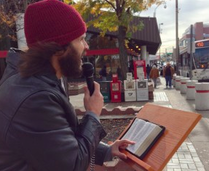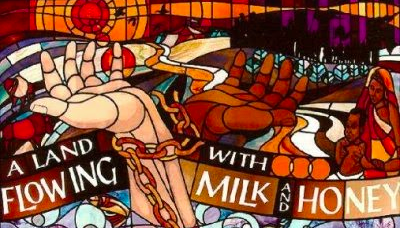 I am reading or have read recently a number of books that seek to explain how we arrived at our very distinct demographic and mostly ethnic divisions that exist today—urban, suburban, and now exurban. (I will leave the rural landscape for others who have studied it more adequately.) Amid these books I am also learning how we have developed a functionally dependent class, mostly non-white, that live and try to survive in the most dense urban areas of our country. Much of what I have read affirms my own writing on the subject, which found its way into chapter 5—“Idolatry and Poverty: Social Action as Christian Apologetics”—of my book, Wasted Evangelism: Social Action and the Church’s Task of Evangelism. Below is a three-part adaption of the latter subsections of this chapter. Idolatry promotes a defective social reality for the non-poor Christian In his Nature and Destiny of Man, Reinhold Niebuhr observed that idolatry is making the contingent absolute, something relative into “the unconditional principle of meaning.” Luke Timothy Johnson points out that, when we consider something as ultimate, this is worship, not just what our lips or cultus ritual render, but in the exercise of our freedom in service to that which we consider absolute and unconditional, and, thus, derive our significance. It is, however, not just an image fashioned with gold and silver that provides the danger and potential of idolatry, for the Bible is clear, such man-fashion idols are no-things (Isa 41:21–24; 44:10; Ps 115; 135; Acts 14:15; 1 Cor 8:4; 10:19; Gal 4:8). Johnson reminds us that “important idolatries have always centered on those forces which have enough specious power to be truly counterfeit, and therefore truly be dangerous: sexuality (fertility), riches, and power (or glory).” It is the body of knowledge that accompanies the object and the habits of service in worshipping the objects (i.e., idols) and, then, the social and cultural habits that follow that develop an everyday “world,” with meaning and definitions for relationships (repeated action, mundane habits), that objectifies reality and maintains significance and plausibility (its symbols and corresponding institutions). Our socially constructed world, then, is reality formed by our service of worship and sustained (validated) through the habits and experience of everyday life.
However, to understand fully the non-poor’s everyday reality, it is simply “not enough to understand the particular symbols or interaction patterns of individual situations.” It is how the “overall structure or meaning” within “these particular patterns and symbols” are experienced. As we seek to apply the gospel that is embedded with texts regarding idolatry (e.g., the overwhelming number in Mark’s own gospel) and, as well, texts indicative of relationships toward the economically vulnerable, it is important to understand how the social-location experienced by many non-poor Christians was formed and its implications for their (i.e., the non-poor) participation in the outcomes of this social-location. Religion once offered an integrating principle that helped provide a “life-world” that was “more or less unified.” But, modern life not only provides a less unified everyday life, now religion often aligns itself with the socio-economic forces that help sustain the plausibility of our faith, which can then inoculate the non-poor Christian from the idolatrous forces embedded in their social-location. Over time new symbols and signs (lawns, yards, gated communities, commutes and highways, social status, shopping malls, upward mobility, the market, double-entry accounting, etc.) that permeate the social-location the modern non-poor Christian experiences as everyday life compete with biblical symbols (e.g., the words of God, the cross, redemptive-historical acts of God in history, etc.). Johnson reminds us, “Prior to any action or pattern of actions we might term ‘Christian’ is a whole set of perceptions and attitudes, which themselves emerge from a coherent system of symbols, and an orientation toward the world and other humans, which we call Faith.” In fact, the very habit of experiencing the fragmented, often unintegrated social-locations over and over everyday might feel like freedom bestowed by our socio-economic system, but actually weakens the plausibility of biblical faith to inform our home world. Non-poor Christians are in danger of idolatry when finding themselves in need of affirming “this worldly” system and its institutions as God-given in order to be at home, plotting their lives on the societal map provided by social institutions rather than biblical discipleship in order to relate—comfortably, plausibly, securely—to the overall web of acceptable meanings in society. As Berger in Homeless Mind points out, because of the plurality of social worlds—work, school, play, third places, highways, commutes, home, shopping, church—in modern society “the structures of each particular world are experienced as relatively unstable and unreliable.” The separated sectors of our social world are rationalized and relativized, forcing the non-poor Christian to justify religiously this worldly system and institutions in order to feel less exposed and vulnerable and more relevant and secure. After decades of political alignment and religious justification, for the most part, the non-poor Christians living in the suburbs now feel at home.
0 Comments
Dangerous Sunday Morning Devotion: Can’t benefit from the milk if your can’t handle lactose8/16/2015
A while ago, I was reading a novel about the investigation of a mysterious plane crash. It was a great read. Enjoyed it immensely. It was entitled Crashers, written by Dana Haynes. “Crashers” is the name given to Go-Teams who are sent in immediately to investigate airline plane crashes, leading experts from specific fields vested in determining the cause of the crash, so it never happens again. In the midst of the storyline, a character, not necessarily religious, ponders a rather curious thought that got me thinking about the church and the poor. She said, "Land of milk and honey . . . Bloody lot of good it does if you can’t handle lactose and you’ve got diabetes to boot."
 Sometimes we should be deeply impacted by a text of Scripture, not so much as an encouragement or a comfort, but seriously scaring us to death. We are conditioned to seek solace, comfort, encouragement, even exhortation, in the Bible. We are told and, perhaps, have taught others to hold on to its promises. But, this is only half right. We should be consoled by texts meant to console, yet scared to death by texts meant to slay us. Ephesians 3:1-13 is one such text of Scripture (despite most preachers never presenting this path of relevance or application from this pericope of Paul’s words–at least to my knowledge). “For this reason I, Paul, a prisoner for Christ Jesus on behalf of you Gentiles—assuming that you have heard of the stewardship of God’s grace that was given to me for you, how the mystery was made known to me by revelation, as I have written briefly. When you read this, you can perceive my insight into the mystery of Christ, which was not made known to the sons of men in other generations as it has now been revealed to his holy apostles and prophets by the Spirit. This mystery is that the Gentiles are fellow heirs, members of the same body, and partakers of the promise in Christ Jesus through the gospel.” Here some of my thoughts that arise from Paul’s words to the church in Ephesus:
I recall, now too many years ago to acknowledge, telling some bible college students that were complaining about the rule that all hats, including baseball caps, were to be taken off inside a campus building: “If you can’t take off those caps now, what makes you think you’ll be able to die for your faith in some god-forsaken land when all indication seems to indicate that God has abandoned you?”
If you are a Christian (especially a Christian leader), you shouldn’t be able to read Ephesians 3:1-13 with any measure of comfort either—and it should scare the hell out of you, as well. The question remains, nonetheless, where will you go? To whom will you go to? With whom will you live and ministry so that all, that is those now outside the church, may have access to the Father?
|
AuthorChip M. Anderson, advocate for biblical social action; pastor of an urban church plant in the Hill neighborhood of New Haven, CT; husband, father, author, former Greek & NT professor; and, 19 years involved with social action. Archives
February 2024
Categories
All
|
Pages |
More Pages |
|

 RSS Feed
RSS Feed